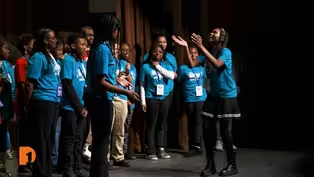
Award-winning jazz bassist Ron Carter celebrates 88th birthday with six-day celebration
Clip: Season 9 Episode 42 | 9m 59sVideo has Closed Captions
Jazz bassist Ron Carter reflects on his career ahead of his 88th birthday celebration.
Grammy Award-winning jazz bassist Ron Carter, a metro Detroit native, is celebrating his 88th birthday with six days of performances April 29-May 4 in New York City. One Detroit contributor Cecelia Sharpe talked with Carter about the celebration, the challenges he faced as a young musician, discovering jazz music, and collaborating with notable musicians like Miles Davis and A Tribe Called Quest.
Problems playing video? | Closed Captioning Feedback
Problems playing video? | Closed Captioning Feedback
One Detroit is a local public television program presented by Detroit PBS

Award-winning jazz bassist Ron Carter celebrates 88th birthday with six-day celebration
Clip: Season 9 Episode 42 | 9m 59sVideo has Closed Captions
Grammy Award-winning jazz bassist Ron Carter, a metro Detroit native, is celebrating his 88th birthday with six days of performances April 29-May 4 in New York City. One Detroit contributor Cecelia Sharpe talked with Carter about the celebration, the challenges he faced as a young musician, discovering jazz music, and collaborating with notable musicians like Miles Davis and A Tribe Called Quest.
Problems playing video? | Closed Captioning Feedback
How to Watch One Detroit
One Detroit is available to stream on pbs.org and the free PBS App, available on iPhone, Apple TV, Android TV, Android smartphones, Amazon Fire TV, Amazon Fire Tablet, Roku, Samsung Smart TV, and Vizio.
Providing Support for PBS.org
Learn Moreabout PBS online sponsorship(upbeat music) (bass playing) - So you started playing the cello at the age of 10 and then switched to bass at Cass Tech High School.
And you were classically trained throughout that time and all the way during your time at Eastman and you transitioned to jazz.
What made you transition to jazz?
- I started about 12 playing the cello.
I was a cellist for a really long time and I was a cellist until my senior year at Cass Tech.
And I noticed that two things were happening, Ms. Sharpe.
One, when the PTA meetings and teacher faculty meetings would have meetings, conventions, they would go around to the Detroit School Music department and pick out some music ensembles to forth what we call wallpaper music during these conventions.
As an African American kid, I never got those offers and I thought I'd played good as everybody else.
And I was very good at math.
I looked around one day at the bass player when the orchestra was graduating, and if he left, there'd be no bass player.
(Cecelia laughs) And my addition said, "Okay, well if I said no one left but me playing the bass, then they'd have to call me."
And, so Eastman School of Music was having auditions at this time for incoming freshman students for the coming Fall term.
And I got a chance to audition as a bass player and he decided that I was a good candidate to get a scholarship to go to Eastman as a bass player.
So my classical training went from Cass Tech underrepresented person of color to Eastman School of Music with a better odds of getting chance to play music that I had been studying all my life as a classical player.
And as I'm at Eastman third year, fourth year, I'm still getting better and better at instrument, I'm realizing I'm feeling the same kind of draft, and that's to say that they post notices on the bulletin board, but they've never explained to the people of color what that really meant for them as far as jobs, auditions here and auditions there.
And they didn't really encourage us to investigate the bulletin boards.
And now I'm playing in the local jazz band.
So I was having a chance to play opposite, really some great bass players.
Isaac Smith, Carmen McRae and Sam Jones with "Cannonball" and Teddy Kotick with Horace Silver, some really good players who encouraged me.
They said, "You seem to have a good idea about the bass.
You should come to New York when you graduate."
And I turned the page and these guys from New York said, "Hey man, there's work in New York.
You can play the bass in New York.
Don't be stuck.
Come on to New York and join us."
- So you found the encouragement from other people.
- Yes.
- And it brought you into jazz.
- Correctly.
- Yes.
- Mm.
Now I noticed on your first two recordings, you were playing quite a bit of cello.
Was it the style of music that was being played or was it your desire to continue to incorporate the cello that caused you to record on the cello as well?
- I just thought I had enough experience to play the instrument.
I didn't know if I could make a record on it 'cause playing is one thing, but to go into the studio and play the same instrument with another environment, with the pressure and the limited space and the limited time and these wonderful players who are already more experienced than I am, it's a whole nother kettle of fish.
Am I a big fish in a small pond or can I go with the sharks?
And these guys are the sharks, you know?
- And you wanna test out to see if you can swim with the sharks.
- I went to school with these guys.
Yeah, they gave me a lesson every night.
There's another page in the book of how to get better at doing this.
Yes.
- We know that you worked with Miles Davis and Cannonball Adderley, but you were also working with artists like Roberta Flack, Gil Scott-Heron on "The Revolution Will Not Be Televised".
You worked with "Black Star", you worked with a tribe called "Quest".
What is the importance to you of staying versatile as an artist and collaborating with various artists?
- Ms. Sharpe, I've always been surprised when my name ends up in the same barrel as all these other bass players.
Certain artists in this industry look for something that makes their music do something other than what they can conceive of.
Who is gonna be the special pepper in this sauce?
Who has the right wine for this meal?
My name has come to the top several times that they feel that my input, however they would define it, it's what their special sauce for this record is backed on track for this baseline needs to make their product do.
They can only imagine this.
- Only with the Ron Carter sauce.
- Yes.
(chuckles) - Can't bottle it.
Can't even bottle it.
- No.
One of a kind.
- I heard in another conversation.
I interpreted as you talking about the value of saying no, the power of saying no.
- Yes.
- And understanding your value and your worth.
Can you speak to that, not only as a musician, but to any individual who is watching understanding the power of saying no as it relates to your value?
- I think two things gotta be on the table, Ms. Sharpe One, this person in question has to have a set of values.
He has to believe in some things that are in his favor.
And once he convinces himself that they are so important to his being and nothing's gonna change him from this concept of what he's responsible for, those two letters controlled his career.
N-O.
You know, years ago, and it's still not that far back, clubs when they hire a band for a week, in the restaurant, they have a special menu for the band.
I'm not sure you're familiar with that, but they have a menu for the audience.
And someday went to this gig and I had worked all day making records, I was in school, wherever I was, and I asked for something to eat and the guy said, "We got a special menu for you guys."
I said, "Oh wow, what is that?"
He didn't answer but gave me a different menu.
I said, "Wait a minute, where's the menu serving that the people have?
I'm equal to that.
I need that kind of nourishment."
He said, "Well, you know, the policy of the club is it gives you many..." "No, no, man.
That's your policy.
That's not mine.
I wanna eat the same kind of quality of food that you make that you think the customer is well worthy of.
And evidently some of the things that I'm not worth that.
Well, no.
No menu, no music.
Goodnight."
And I kind of accepted that view as that's my view of knowing when no is critical to my viewing of my survival and what I think I need to be able to make my presence not just necessary, but physically capable of doing the job I'm being hired to do.
- Do you have any advice for people on building that confidence to say no?
- Ms. Sharpe, I think what they have to do is what really feels good to them when they see them in the mirror.
I think they have to understand that they're representing their view to a bunch of strangers every night.
People see you walk on the stage as a guy holding an instrument.
They have no idea what this person's values are once they stop playing.
I want these people to know that I am somebody.
I'm playing the bass two shows a night.
That's for like the hour and a half, but for the other 21 hours of the day, I got something else going on up here that I'm responsible for and I'm not playing the bass.
Look at what else I do.
What else am I in favor of?
And what else can I say no to and feel okay?
(chuckles) - We have to talk about the big 88.
So you're celebrating for six days, April 29th through May 4th.
- Yes.
- Tell us about what people can really get into to celebrate Ron Carter turning 88 years old.
- They're watching someone who never conceived of being this age.
I always thought I'm a musician and I'm playing music.
Cello, classical, jazz, bass, whatever it is, that's what I'm doing to be breathing.
People see the culmination of 75 years of trying to play the best I can every night for whoever else I'm playing with.
They will see me be overwhelmed by the love of the people I'm playing with that week.
The big band, the quartet, the trio, the duos.
They would come to see me pouring myself out as I do every night when I play for these people.
Focused in on one week for the birthday.
And I'm just thrilled to know that I'll be able to look around and see these people who say they love me and they mean it.
(bass playing) (audience laughing) (bass playing) (audience cheering) - [Will] There's a lot to do in Metro Detroit
Detroit Creativity Project uses improv comedy to teach youth confidence and collaboration
Video has Closed Captions
Clip: S9 Ep42 | 10m 49s | The Detroit Creativity Project shows how youth can use improv comedy on and off the stage. (10m 49s)
One Detroit Weekend | Things to do around Detroit this weekend: April 18, 2025
Video has Closed Captions
Clip: S9 Ep42 | 2m 3s | Check out events for Earth Day, Arab American Heritage Month and Easter around Detroit this weekend. (2m 3s)
Providing Support for PBS.org
Learn Moreabout PBS online sponsorshipSupport for PBS provided by:
One Detroit is a local public television program presented by Detroit PBS













